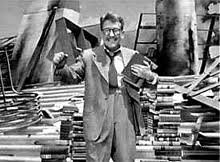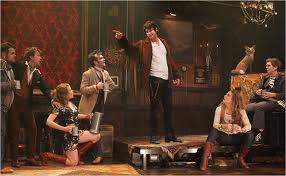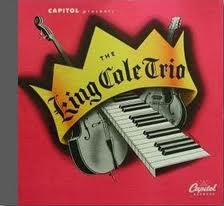A Life in the Theatre (Gerald Schoenfeld, 236 W. 45, now closing Nov. 28). David Mamet’s 1977 two-man play about a pair of actors, one young and one old, who are battling for dominance over one another, now on Broadway in a production graced by a superlative performance from Patrick Stewart. Though his acting is unmistakably English in tone–Americans expect a faster pace in Mamet–Stewart is fully alive to the complicated mixture of envy and rue that his character feels as he watches his younger, more talented colleague (T.R. Knight) take flight. The results are poignant and compellling (TT).
Archives for October 2010
TT: Traveling light
Mr. Jazz Lives asks:
When we are able to buy all the recordings of Louis or Django at one expensive shelf-filling gulp, do we listen to them completely? Or are we perversely overawed by the completeness, the profusion?…
I am reminded of my conversation with a musician who is now eighty, who talked about being able to buy one 78 record a week, so it had better be perfect. I am sure that had he, in 1944, been able to visualize the Complete Art Tatum Solo Performances in one package, he would have seen it as a wondrous mirage. How does it make us feel, I wonder. When our wants are gratified, will we be happier?
 When I read this passage, I recalled the perverse sense of gratitude that I felt when I moved to a much smaller apartment a number of years ago and was forced to dispose of roughly two-thirds of my personal library–mostly books, to be sure, though I also pruned my CDs extensively and continue to do so on a regular basis.
When I read this passage, I recalled the perverse sense of gratitude that I felt when I moved to a much smaller apartment a number of years ago and was forced to dispose of roughly two-thirds of my personal library–mostly books, to be sure, though I also pruned my CDs extensively and continue to do so on a regular basis.
Joseph Epstein, who had previously done the same thing, wrote an essay about the experience called “Books Won’t Furnish a Room” that made a powerful impression on me at the time. This is the next-to-last paragraph:
I have almost as little desire to live in a library as I do on a golf course. I seek a compromise: living in a place where not every wall has a bookcase. I hope that by now the book collector’s impulse is dead in me. With luck, I expect always to have the right books to keep my mind engaged, to put me gently to sleep at night, to be on hand to distract me during bouts of insomnia. I’m far from ready to go so far as Philip Larkin and say that “books are a load of crap.” But in selling off my books I felt I was freeing myself in some way, entering another stage in life–though I’m not altogether clear what it might be. Behind my selling all these books was a longing to streamline my life a bit, make it feel less cluttered, encumbered, book bound. In doing so, I feel as if I had gathered my desert-island books about me without actually having to sail off for the island….
It was this piece, which was originally published in 2000, that gave me the courage to shed so many of my books and CDs. Never since have I regretted that hard decision, not even when I find myself briefly wishing that I had a specific book or album close to hand for purposes of research.
 This is even true in the case of the jazz CDs that rank among my greatest treasures. I, too, once felt the mad desire to own every jazz record ever made, and to have them all shelved in chronological order at arm’s length from my desk. Today I own just two racks, and whenever I acquire a new album, I get rid of an old one in order to make room for it. Not only has this imperative made me ruthlessly selective, but it has forced me to reconsider my priorities. Time was when I bought records in order to say that I had them. Now I keep them only because I love them.
This is even true in the case of the jazz CDs that rank among my greatest treasures. I, too, once felt the mad desire to own every jazz record ever made, and to have them all shelved in chronological order at arm’s length from my desk. Today I own just two racks, and whenever I acquire a new album, I get rid of an old one in order to make room for it. Not only has this imperative made me ruthlessly selective, but it has forced me to reconsider my priorities. Time was when I bought records in order to say that I had them. Now I keep them only because I love them.
No doubt the day is almost here when it will be possible for people like me to download the Complete Performances of Everybody to our computers…except that I’m no longer that kind of person. I love Art Tatum, but I don’t want to own every record he ever made. I want to own the ones that matter to me, and let the others go. I want to be able to pull a CD or book from my shelves at random and know that it will please me, just as I hang on my walls only paintings and prints that move me deeply.
Why have I come to feel this way? Because I’m fifty-four. Life, I now know, is short, too short to waste, and the actuarial tables leave no possible doubt that most of mine has passed me by. As a professional critic, it’s my job–my destiny, you might say–to spend a fair amount of time experiencing art that I don’t like. Insofar as possible, though, I don’t propose to waste any more of the days that remain to me consuming bad art than is absolutely necessary. Unless I’m being paid to do so, I won’t even finish reading a book I don’t like, or listening to a record that fails to engage me. I have better things to do, and not nearly enough time in which to do them.
TT: The Ruhl thing
I review the Roundabout Theatre Company’s production of The Language Archive, Julia Cho’s new play, in the Greater New York section of today’s Wall Street Journal. I found it a disappointment–for reasons that I didn’t expect. Here’s an excerpt.
* * *
Much of “The Language Archive” has a shopworn ring, for it’s yet another tale of emotionally inhibited middle-class folk who lead Lives of Quiet Desperation. George (Matt Letscher) is a brainy linguist who can’t put his feelings for Mary (Heidi Schreck), his romance-starved wife, into words. This inspires Mary to pack her bags and catch the next train elsewhere. Meanwhile, we learn that Emma (Betty Gilpin), George’s lab assistant, has an unrequited crush on her boss that she can’t put into words. This inspires her to go out and study Esperanto, George’s favorite language. In due course Emma meets Mary, who has found her bliss by becoming a baker of artisanal breads…
Like many American playwrights, Ms. Cho pays the rent by writing for TV, and I wonder whether her work on “Big Love” might be nudging her away from the tough-mindedness one expects from a properly promising young playwright. It seems at least as likely, though, that she has succumbed to the baleful influence of Sarah Ruhl, whose stomach-turning brand of preciousness is the latest theatrical fashion and whose sticky stylistic fingerprints are all over “The Language Archive.” Indeed, it would appear that Ms. Cho (or Mark Brokaw, her director) has gone so far as to appropriate one particular piece of stage business from Ms. Ruhl’s “The Clean House,” a scene in which George teaches the audience how to conjugate the verb “love” in Esperanto while appropriate phrases are flashed on a screen suspended above the stage…
* * *
The print version of the Journal‘s Greater New York section only appears in copies of the paper published in the New York area, but the complete contents of the section are available on line, and you can read my review of The Language Archive by going here.
TT: Almanac
“In art economy is always beauty.”
Henry James, preface to The Altar of the Dead
UNFORGETTABLE—IN MORE THAN ONE WAY
“Part of what made Nat Cole so remarkable, of course, is that he was as accomplished a singer as he was a pianist. While it isn’t all that unusual for artists to wear two creative hats, you can almost always tell which one they favor. But a handful of artists have done significant work in more than one field, and their ability to do so without apparent strain is one of the enduring mysteries of art…”
TT: Emo-cracy comes to Broadway
In today’s Wall Street Journal drama column I review two Broadway openings, Bloody Bloody Andrew Jackson and La Bête. The first impressed me, the second bored me. Here’s an excerpt.
* * *
“Bloody Bloody Andrew Jackson” is a not-exactly-history play in which the life of America’s seventh president is given what might be called the Jon Stewart treatment (i.e., lots and lots of Irony Lite) and set to the style of rock known as “emo” (i.e., unabashed emotion accompanied by a just-kidding wink that draws the deadly sting of sincerity). And what are the results? Mixed–but also, if a middle-aged critic may dare to say so, hugely encouraging.
 In “Bloody Bloody Andrew Jackson,” whose book is by Alex Timbers, Old Hickory (played with swaggering panache by Benjamin Walker) becomes a rock-star politician who speaks in the language of today, as do all his fellow characters. He’s an Indian-hating populist from rural Tennessee who trades on his sex appeal to get the plain people to vote for him–think Bill Clinton with a guitar–then discovers, much to his surprise and dismay, that he hasn’t any idea of how to actually run the damn country.
In “Bloody Bloody Andrew Jackson,” whose book is by Alex Timbers, Old Hickory (played with swaggering panache by Benjamin Walker) becomes a rock-star politician who speaks in the language of today, as do all his fellow characters. He’s an Indian-hating populist from rural Tennessee who trades on his sex appeal to get the plain people to vote for him–think Bill Clinton with a guitar–then discovers, much to his surprise and dismay, that he hasn’t any idea of how to actually run the damn country.
Comically speaking, “Bloody Bloody Andrew Jackson” is a one-joke show that gets three-quarters of its laughs from the incongruity of hearing 19th-century characters use 21st-century slang: “The Era of Good Feelings? Huh! More like the Era of Bad Feelings! You guys are so dead!” Politically speaking, it’s little more than an ultra-predictable mashup of Howard Zinn and “Dances With Wolves” (white people bad, red people good). We are, in short, in the land of cable-TV sketch comedy…
Michael Friedman’s hard-edged, guitar-driven score is, however, another story. The music is tuneful, the lyrics are honest-to-God smart, and one of the songs, “Ten Little Indians” (which is wonderfully sung by Emily Young), is catchy enough to hum on the way home. Nor is there the slightest trace of slickness: This is real rock, not the synthetic kind…
I confess to being impressed by the sheer gall, if nothing else, of the producers who decided that it was time to bring back “La Bête.” Though it went over well in England, winning an Olivier Award, David Hirson’s verse comedy was a disastrous failure on Broadway, where it opened in 1991, was greeted by universal critical catcalls, and closed 25 performances later, draped in ignominy from head to toe. So why in the name of the bottom line is this awful play–for it is truly, excruciatingly awful–back for a second go-round?
The answer is Mark Rylance, who starred in “Boeing-Boeing” and is now giving another over-the-top performance as Valere, a fathomlessly vulgar, monstrously vain street player who has been thrust upon Elomire (David Hyde Pierce), the celebrated 17th-century playwright, and his resident drama troupe by the princess (Joanna Lumley) who is the company’s all-powerful patroness. Mr. Rylance comes out belching and gets grosser from there, embellishing virtually every line he speaks with a fresh bit of business from his bottomless bag of comic trickery. Mr. Rylance is one of the finest stage comedians we have, but he has nothing to work with this time around. “La Bête” is a wan pastiche of Molière whose pancake-flat couplets rattle on endlessly, pointlessly and–above all–pretentiously….
* * *
Read the whole thing here.
TT: Unforgettable—in more than one way
 Hep Records has just released a hitherto-unknown 1949 concert recording by the King Cole Trio. Seeing as how Nat Cole is not only one of the great vocal balladeers but my all-time favorite jazz pianist, it seemed logical to write a “Sightings” column for today’s Wall Street Journal taking note of the occasion–but I widened my field of fire to talk about other artists who, like Cole, are exceptionally good at more than one thing:
Hep Records has just released a hitherto-unknown 1949 concert recording by the King Cole Trio. Seeing as how Nat Cole is not only one of the great vocal balladeers but my all-time favorite jazz pianist, it seemed logical to write a “Sightings” column for today’s Wall Street Journal taking note of the occasion–but I widened my field of fire to talk about other artists who, like Cole, are exceptionally good at more than one thing:
Sometimes it makes sense, or appears to at first glance, when talented artists choose to take up a second line of creative endeavor. Only on closer inspection does the extent and originality of their achievement become clearer. It may have seemed logical enough in 1971 that Clint Eastwood should have wanted to try his hand at directing “Play Misty for Me”–but who could have predicted that the hottest action star of the ’60s and ’70s would evolve into the auteur of such emotionally complex films as “A Perfect World” and “Letters from Iwo Jima”? Or that Edgar Degas, who in his lifetime exhibited only one sculpture, “The Little 14-Year-Old Dancer,” should have completed several dozen other three-dimensional works discovered after his death in 1917 that are now generally thought to be identical in quality and importance to his paintings?
I find it at once inspiring and frustrating to watch a genius pull a second rabbit out of his hat….
Read the whole thing here.
* * *
Nat King Cole performs “Little Girl” in 1950 with Irving Ashby on guitar, Joe Comfort on bass, and Jack Costanzo on conga drum:
TT: Almanac
“I’ve often felt that life is a hard deal and it’s unrelentingly tragic and an uphill fight. But you can on a day walk into a movie house and for an hour-and-a-half see Fred Astaire dancing and escape in it. Then you walk back out of the darkness into the hot sun and into real life. You were at least refreshed. Like stopping in a bar on a hot day and getting a cold beer and you rest for 10 minutes and then go on with your journey. Instead of the Bergmans and filmmakers like that, is it the escapist filmmakers that are making a more practical contribution to life by giving you this respite?”
Woody Allen, interviewed in The Wall Street Journal (Sept. 15, 2010)
